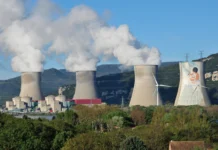
Thousands of people will have the chance to train for careers in nuclear fusion technology, under UK government plans unveiled on 16 October.
Speaking at the IAEA Fusion Energy Conference, Nuclear Minister Andrew Bowie set out details of the new £650 million Fusion Futures Programme – part of the UK’s updated Fusion Strategy.
Measures include the creation of more than 2,200 training places across the country, a new fuel cycle testing facility to focus on commercialising the technology and funding to develop infrastructure for private fusion companies.
This includes growing and improving the UK Atomic Energy Authority’s (UKAEA) dedicated campus in Culham, Oxfordshire, recently visited by Energy Secretary Claire Coutinho, which will help drive further investment.
Fusion could generate a near unlimited supply of clean electricity in the long-term, and its development in the UK will help to create jobs, grow the economy, and strengthen the country’s energy security – delivering a cleaner energy system that will benefit future generations.
The UK is already a world leader in fusion technology and is well placed to share its knowledge and expertise around the globe. This Government support will further cement that position, with the £650 million spending outlined today taking the total Government investment in fusion to over £1.4 billion since 2021.
Speaking at the IAEA Fusion Energy Conference 2023, Minister for Nuclear and Networks, Andrew Bowie, said: “With world-leading scientific talent and expertise based here in the UK, we have a golden opportunity to be at the cutting-edge of fusion and lead the way in its commercialisation as the ultimate clean energy source.
“The Fusion Futures Programme, backed by £650 million, will be at the core of delivering this, training thousands of people across the country and ensuring we have the best possible facilities to develop this exciting new technology.”
CEO of the UK Atomic Energy Authority (UKAEA), Professor Sir Ian Chapman, said:
“Delivering fusion power will require ideas to solve science and engineering challenges, involvement of industry partners, development of thousands of skilled people and strong international partnerships.
“Fusion Futures will invest in all of these aspects – a truly concerted programme that will support economic growth and high-quality jobs as well as advancing fusion as part of a future sustainable energy mix.”
The £650 million funding for the Fusion Futures Programme will include:
- Up to £200 million for a Fuel Cycle Testing Facility, to develop technology in breeding fuel for fusion power plants, which will provide opportunities for the UK to become a world leader and exporter in tritium intellectual property;
- Up to £200 million for vital R&D ensuring industry can develop and design components for future fusion powerplants;
- Up to £50 million for growing and improving the Culham campus in Oxfordshire, building new premises to create vibrant concentrations of fusion companies, and helping drive inward investment into the UK;
- Up to £55 million for a Fusion Skills Programme, to train over 2,200 people over the next five years by working with business and universities to expand fusion training programmes;
- Up to £35 million additional funding for the Fusion Industry Programme (FIP), a challenge fund supporting UK companies to develop new technologies;
- Up to £25 million to enhance international collaborations on fusion R&D, to export UK expertise and make best use of global knowledge to accelerate fusion energy;
- Up to £18 million for a Technology Transfer Hub, strengthening connections between the UK’s leading research organisations and other programmes worldwide, with a focus on commercialising fusion research;
- Up to £11 million to further support the STEP programme and upskill UK industry to help deliver it.
The announcement follows confirmation from the Government in September of its plans to put in place a suite of new research and development programmes to support the UK’s fusion sector and strengthen international collaboration.
The programme aligns with the core principle of international collaboration in the UK’s updated Fusion Strategy, also published on 16 October. The UK remains open to collaboration with the EU and other international partners, and this will form a key part of this new programme of work.
The fusion process involves heating a mix of two forms of hydrogen to extreme temperatures, 10 times hotter than the core of the Sun, causing them to fuse together to create helium and release huge amounts of energy.
The energy created can be used to generate electricity in the same way as existing power stations. Fusion is many million times more efficient, per kilogram, than burning coal, oil or gas.







